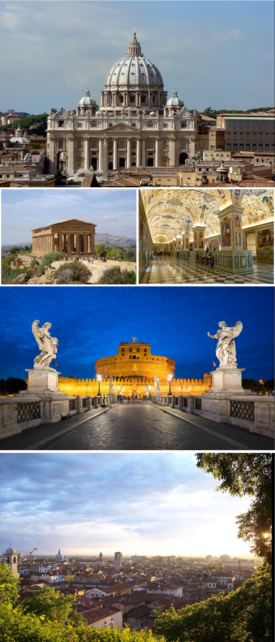Deopolis
Deopolis | |
|---|---|
 From top, left to right: St. Leo's Cathedral, ancient Friulian temple on the outskirts of the city, the Leotine Hall in Leotine Chapel, Castuhinga dox Anmua, and a view of the city from Milvian Heights | |
| Etymology: Aroman for "City of God" | |
| Nickname(s): Ziologiana (Friulian, historical) Capital Caput dox Salveae (Salvian) | |
| Motto(s): Atua dox Amare, Atua dox Iustito "God of Love, God of Justice" | |
| Country | |
| Region | Salvia |
| Province | Ziogolora |
| Communes | Aslanai Copiatoli Gaumonte Marcati |
| Founded | 6th century BC |
| Administrative division | 4 communes |
| Government | |
| • Mayor | Petior Hialgo (TP) |
| Area | |
| • Capital city | 103.4 km2 (39.9 sq mi) |
| Population (1 January 2020 (est)) | |
| • Capital city | 2,232,198 |
| • Density | 22,000/km2 (56,000/sq mi) |
| • Metro | 4,535,901 |
| Demonym | Deopolisian(s) |
| Time zone | UTC+3 (Central Adlantic Time) |
| Salvian Postal Code (SPC) | 00001–00020, 00023 |
Deopolis, known in Salvian as Deopolia, is the capital of Salvia, as well as the regional capital of the Ziogolora province. With a population of 2,232,198, it is the most populated city in Salvia and the third largest in Marenesia. The city is also the center of the Deopolis Metropolitan Area, which has a population of 4,535,901, making it the most populous metropolitan city in Salvia. It sits on the central-eastern seaboard of Salvia along the Milvian River and borders the Ascloni region to the north and the Lavazza region to the south. The city acts as the transportation hub of the nation, with Deopolis hosting major railways, highways, and two of Salvia's seven international airports.
Founded under the name of Ziologiana sometime in the 6th century BC, the city grew in size and prominence during the First Salvian Imperium and became the imperial capital, and is regarded by many as the first metropolis in Marenesia. Falling into ruin amidst constant sackings during political turmoil in the 7th century AD, the area remained largely uninhabited until its reconstruction by King Joseph I, who upon coronation declared it the capital. The city was swiftly repopulated and acted as the capital of the Holy Salvian Catholic Empire for most of its six century history. Popes and Salvian kings promoted the sciences, culture, and banking in order to make Deopolis the cultural and economic capital of Marenesia - they largely succeeded, with Deopolis becoming one of the major centers of the early modern Renaissance as a result. The city would recover its population that it lost during the High Middle Ages and retain its position as the most populous Salvian city to the present day. During this period, poets and artists such as Eugune de la Rose and Bero Carcinitti would coin the nickname "Capital of Salvians" (Salvian: Caput dox Salveae) as the capital became the center of bourgeoisie and noble Salvian life during the early modern era. It would remain the cultural and economic center of Salvia into the 21st century.
Deopolis received 9.8 million visitors in 2019, ranking 8th in the wurld and first in Marenesia. Numerous locations in the city are recognized as Wurld Heritage Sites for their historical, cultural, or religious significance; some of these include the numerous religious sites on Cavo Hill, such as St. Leo's Cathedral and Leotine Chapel, Deopolis's historical centre, and the Salvian Centre of Arts, one of the largest art museums in the wurld. Deopolis is the host of the Tenaruan Continental Alliance and hosts seats of several other organizations, including the Group of Island Nations and TRIDENT. Numerous international and national businesses and banks have their headquarters located in the financial centre. In sports, the city is represented by its football and rugby teams in Borosalvo Stadium.
Etymology
The historic and modern names of the city are often direct translations of phrases. The historic name for the city, Ziologiana, derives from the Friulian word for "capital" or "city", although some linguists and historians have begun to debate the theory and instead argue that the word most likely derives from the Friulian zio, meaning settlement, and gonia, loosely meaning "river"; literally, "settlement on the river". While medieval sources support the argument of the former, the lack of contemporary sources results in either being possible.
The Aroman Deopolis or Salvian Deopolia are both direct translations of the phrase "City of God", which was made the official name of the city during its reconstruction in the 13th century by King Joseph I.


